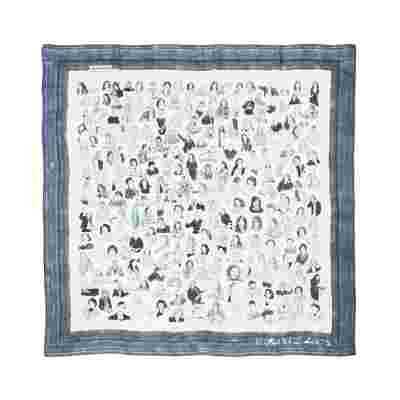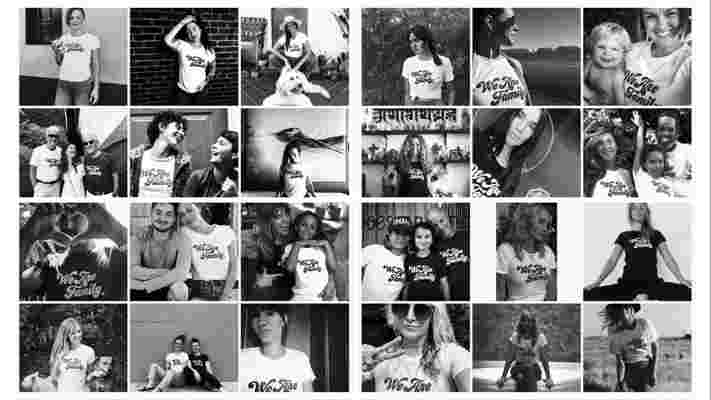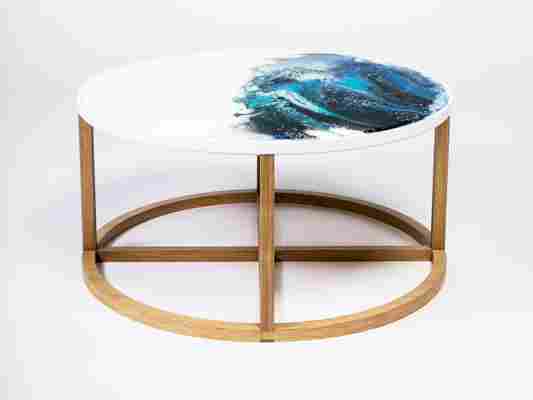When it comes to design today, whether in fashion, furniture, graphics, or architecture, change is happening. Conversations invariably center on working sustainably, and design is more often used to express values and make a point. From Vivienne Westwood in the 1970s to Balenciaga’s partnership with the World Food Programme for their Fall Winter 2018 collection, from Katherine Hamnett’s manifesto tees to Gucci’s Chime for Change movement, there is a legacy of designers and brands using their voices to make the world a better place. Using creativity as a vehicle, it is a way to make people stop, think, and hopefully do the right thing.
Right now, Brexit is the biggest issue Britain has to deal with. In the U.S., it’s all about voting Trump and his cohort out. Fascinated by U.S. politics and its impact on our lives in the world, U.K. textile designer Luke Irwin, who is most known for his spectacular silk rugs, launched his conversation-starting Seat of Power chairs on the eve of the U.S. midterm elections. Why? “Today, we are so aware of power issues. As politics gets more polarized, the chairs were about trying to create something, which is effectively a Speaker’s Corner,” Irwin says of the dramatic hammer and sickle framed chairs that are loaded with symbolism about power and its abuse.

Resistance by Design’s Herwave 2018 silk wrap.
In an effort to create conversation, to inspire and to challenge—the interpretation is blatant. The U.S. flag is sitting in the lap of a hammer and sickle, with the stars fleeing their rightful homes. Available in limited editions of five, the idea is to build a series out, with future designs adding a jolt to issues on feminism, representation, and diversity. This is just the start.
There are other designers working hard to create change by leveraging their unique skill sets. Dahna Goldstein and Alexandra Posen (sister of Zac) founded Resistance by Design from a desire to influence political dialogue and play a role in implementing change. For their first product, they created Herwave 2018, a silk scarf etched with fine line drawings of every Democratic female politician candidate on the November 6th ballot. “This project is about encouraging discourse,” Posen explains. “People are talking about the amazing Democratic women running for Congress. They’re talking about how women are running in historic numbers. They’re talking about how the future is female. People wearing an item that reflects this movement inspires those conversations in all spheres of life. On a practical level, we’re raising money to help more Democratic women run for public office.”

Communicating a message and inspiring loving action is the motivation behind Be Love Apparel’s designs. Pictured showing their support, Julia Roberts and Orlando Bloom are followers of the We Are Family revolution.
Also raising money for political injustice is KamGi Chak, founder of California-based Be Love Apparel. Chak has joined forces with Together Rising, and their We Are Family slogan tees support the reunification of families separated at the border. “A T-shirt can send a strong message of solidarity,” says Chak on the We Are Family graphic. “It serves as a personal billboard that’s simple [and] strong, and communicates that together we can make a difference.”
In the world of furniture, the topic of Dutch Design Week 2018 was "If not us, then who?" which focused on thought-provoking design that speculated on the future. In the U.K., St James Interiors' new Ocean Table supports the efforts of the Blue Marine Foundation with 20 percent from each sale going towards their sustainable fishing cause.

A 20 percent donation from each sale of the Ocean Table by British design company St James Interiors goes to support the Blue Marine Foundation. Its aim is to place at least 10 percent of the world’s oceans under protection by 2020, creating marine reserves and establishing sustainable models of fishing. The Ocean Table is priced at $5,600.
According to Edelman’s Earned Brand 2018 study, consumers around the world would prefer to spend their money on brands that take a stand on a social or political issue. Consumers support brands that align with their own values and snub companies that do not. For instance, Nike’s latest Just Do It campaign, featuring U.S. football player Colin Kaepernick, saw its Labor Day sales rise sharply as shoppers psychologically cheered on Kaepernick’s protest against racial injustice by refusing to salute the U.S. flag.
In Irwin’s case, he created something with intent to stir, and imagines the U.S. attorney Robert Mueller sitting in one of his thrones and the fallen leader of the U.K. Independence Party Nigel Farage in the other. “The only criteria is that no current politician sits in it, because they have lied and cheated and failed us,” Irwin states. “The chairs should be for all opinions about power—not just the ones I happen to approve with.”
We don’t all have the articulateness to put it like George Orwell (“Four legs good, two legs bad), but beyond the glowering presence of these chairs and their political messaging, they are actually really comfortable to sit in. Irwin agrees: “They are the perfect lounge chair. Especially for when you want to feel powerful.”
RELATED: What Curators Are Looking for in Women’s March Signs
